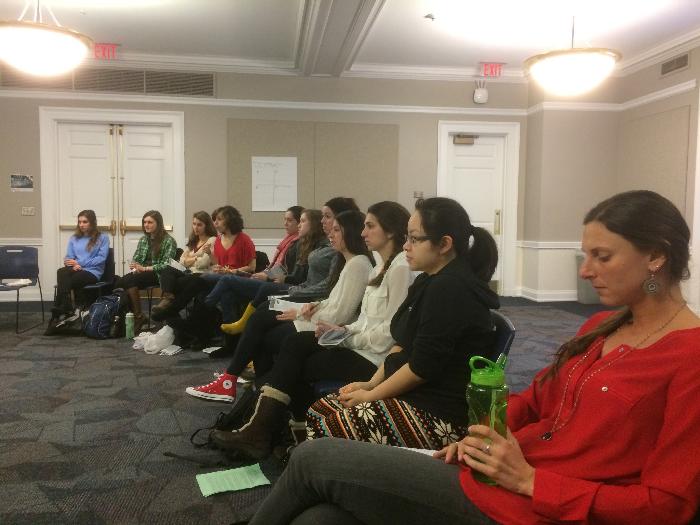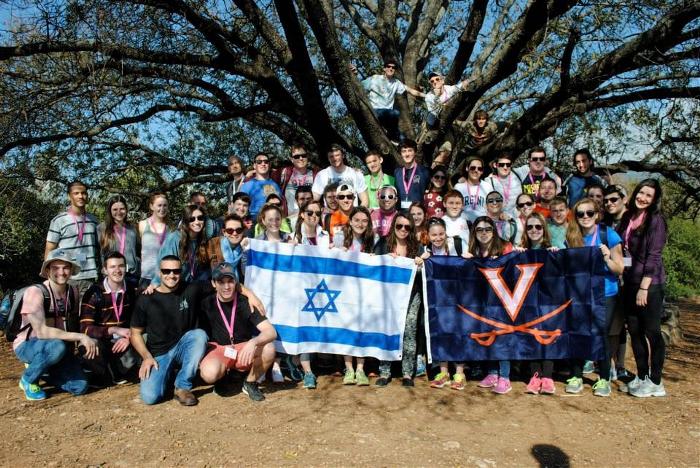In addition, we discussed how “checking in” or monitoring a situation while out on a Friday night does not suggest a negative assumption regarding the personality of the participants – rather, this intervention represents our responsibility to create a Community of Care, in addition to upholding the Community of Trust we all value so highly. We learned that the three D’s of intervention are: (1) Direct: check on individuals involved; (2) Delegate: get someone else to step in; (3) Distract: create a diversion to diffuse the situation.
The Overview Talk was personal for me, as I am active in the sexual assault advocacy community through Take Back the Night, and one of my undergraduate majors, Women’s Studies. The main objective of Green Dot is to encourage students to proactively, and retroactively as needed, diffuse Red Dot situations and eliminate the social acceptance of Red Dot behaviors. Looking at a map of Grounds filled with green dots superimposed onto red dots, I found myself feeling thankful for the positive, safe environment provided by Hillel staff at the Brody Jewish Center. Next steps include extending this feeling of community and safety to all of Grounds. I realize now, as a fourth year, how integral the wonderful, secure community of Hillel has been for me throughout college. Moving forward, I hope you will keep an eye out – we will host a separate Ask Big Questions discussion on the intersection of Judaism, communal responsibility, and bystander intervention on Grounds later this semester! Haley Swartz Class of 2015
Before the speeches and activities began, we sat down for lunch, and I was able to meet a few of the Israelis. This winter I traveled to Israel on Birthright with Hillel at UVa, and we were able to bond about the experience- we even had mutual friends on Facebook (insert Jewish geography joke)! I’ve always been impressed with the way Israelis carry themselves, specifically in their levels of maturity. I spoke with one of the Israelis named Or, who is also a brother of AEPi at IDC Herzliya. We came to the conclusion that because of the lifestyle they live in Israel – with the army and the type of people – there is an emphasis on independence and early learning. He said that in the army you learn things that cannot be taught in school like meaningful lessons in accountability and responsibility.
Later, I sat down with two Israelis, Dor and Avi, for an activity that involved depicting America or Israel through the others’ eyes. Dor and Avi spoke about what they thought America meant to them, their parents, their friends and to Americans, and I did the same for Israel. They shared the typical stereotypes of college parties and big business, but they also pointed out some more interesting complexities of American culture. Seeing that they do not see every piece of American news, they focused on the bigger, controversial stories as thematic of American culture. Things like race, the two party system and safety. I went on to describe my sentiments toward Israel and how much it means to my family living in America and in Israel. Dor, Avi and I really bonded over our shared passion for Israel, and it made me remember the great times I had this winter on Birthright. Overall, I was so excited to help host this group of Israelis and I hope they come back soon! Zach Gelfand Class of 2017 |
The Brody Jewish Center, Hillel at the University of Virginia, is the focal point in a renaissance of Jewish life for the 1,000 Jewish students on Grounds. Archives
September 2021
Categories
All
|


 RSS Feed
RSS Feed